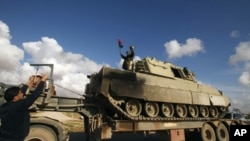A coalition of Western and Arab nations has jumped into the conflict in Libya under the authority of a U.N. Security Council resolution. But some analysts say that in doing so, the West may be creating a situation in which neither Libyan leader Moammar Gadhafi nor the anti-government rebels win. A prolonged stalemate could push the coalition into more aggressive but politically risky action to oust Colonel Gadhafi.
Speaking on Fox News Sunday, the chairman of the U.S. Joint Chiefs of Staff, Admiral Michael Mullen, noted that the U.N. resolution only stipulates the protection of civilian areas and does not call for Colonel Gadhafi’s ouster.
"The focus of the United Nations Security Council resolution was really [the rebel stronghold of] Benghazi, specifically, and to protect civilians. And we have done that, or we have started to do that. This is not about going after Gadhafi himself or attacking him at this particular point in time," he said.
But some analysts are voicing concern that by giving the rebel forces only limited backing, a stalemate may be in the offing in which neither side wins decisively. A former Defense Intelligence Agency Mideast analyst, Jeffrey White, says that even with the establishment of the no-fly zone and attacks on some Libyan military facilities, the outcome is not clear.
"The government has been weakened, or government forces have been weakened, by the no-fly zone and the ground attacks that have occurred so far. But they’re certainly not out of it, and they’ve demonstrated that they do have some adaptive qualities and that they may be able to weather this unless the attacks are pressed home hard enough," White said.
A worst case scenario might force a de facto partition that leaves Colonel Gadhafi in control of Tripoli and parts of the west, and a breakaway rebel administration based in Benghazi in the east.
Former State Department intelligence analyst Wayne White says the prospect of such a scenario might push the coalition to take stronger action in support of the rebels. "Gadhafi is shaky, even back in the west [of Libya]. And the extent to which his regime is isolated and the international community provides support to a coherent opposition might actually undermine him in the west [of Libya], might actually bring fractures in his own regime. And I don’t think anyone who participated in advocating action at the U.N. was interested in anything that would preserve a divided Libya. They’re interested in getting rid of Gadhafi," he said.
But, as Admiral Mullen noted, the U.N. resolution does not call for regime change, and it specifically bars any "foreign occupation force" in Libya. Former DIA analyst Jeffrey White says there are other actions the coalition can take, such as attacking communications lines and giving the rebels arms. But, he adds, that would be perceived in some nations as taking things too far. "But any of those actions, though, will be seen or interpreted as dramatically changing the balance in favor of the rebels and preparing conditions for a regime change," he said.
Military analysts have said that the rebels are poorly armed and equipped, but that the Libyan army is hardly a crack fighting force. Wayne White describes it as "the worst military of any of the major states in the Middle East."
Libya Stalemate Could Draw Stronger Action




